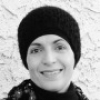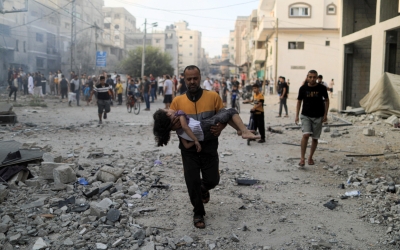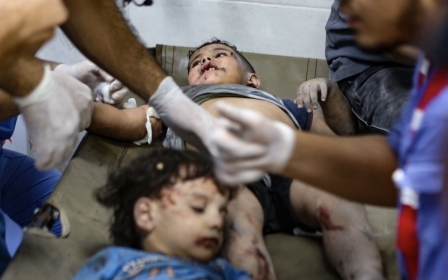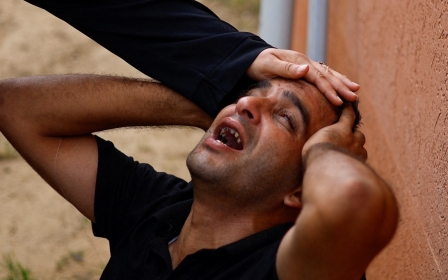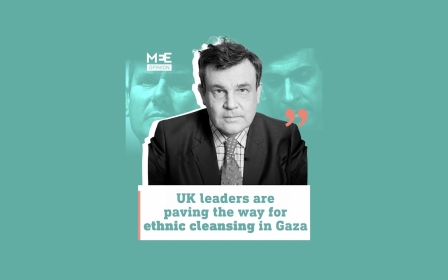Israel-Palestine war: My daughter is weeping on the phone. Mum, we are turning into numbers
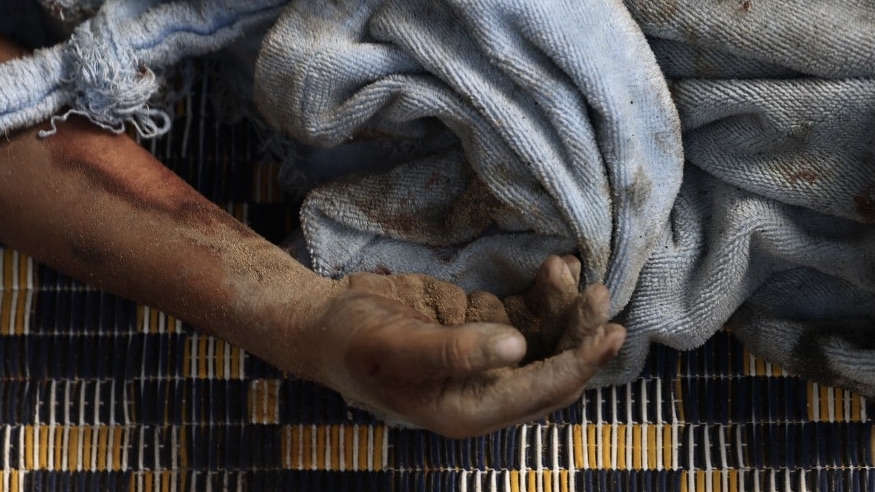
I can't take the shock and horror.
I met Dr Medhat Saidam last summer when I visited Gaza. Another kind soul is now gone. Dr Saidam went home for a couple of hours, after a full week of working nonstop, to rest and check on his family. An hour later he returned to the hospital as a lifeless body.
I wonder about my brother, a doctor working at Nasser Hospital in Khan Younis. I call my family, but no one responds. Three days and no news about them.
I turn to Facebook only to find that our friend, Dr Rami Abdo, has reported the death of his uncle, Dr Omar Ferwaneh, a physician and the dean of the faculty of medicine at the Islamic University - known as the doctor of the poor - killed along with his wife, children and grandchildren. I get back to the news.
The news continues to pour in from the occupied and besieged Gaza Strip, bringing with it a ruthless stream of family massacres. Nonstop.
The latest atrocity was the Israeli bombing of Al-Ahly hospital, killing hundreds of patients, wounded children and people who took shelter at the hospital thinking it was a safe refuge.
The number of casualties keeps climbing, currently reaching 3300 killed and 12000 wounded, the vast majority women and children.
The deaths are stark and vivid, not abstract or distant. They are broadcast as they unfold, documented and captured by cameras, and yet the world remains largely unmoved. The mind struggles to comprehend the scale of this tragedy.
Follow Middle East Eye's live coverage for all the latest on the Israel-Palestine war
Families, real families and real children, are being wiped out one after another. The images of dead bodies and wounded people keep flooding Gaza's overwhelmed and broken hospitals. Doctors, working under the bombardment, are in a constant state of shock and go on dealing with an unprecedented number of casualties, in defiance of the settler-colonial state’s calls to evacuate hospitals.
Rejecting the call, they became the target. Dr Mohamed Abu Musa is notified that his home has been bombed. His family is gone. He keeps on working, committed to saving those who are still alive. Another shock.
'Mum, we are turning into numbers'
The shocking news is relentless. Dr Ashraf al-Qidra from al-Shifa Hospital is on Al Jazeera TV again naming more dead colleagues. I can't remember the names.
His face tells the story. He recounts the senseless deaths, the mutilated bodies of the dead and the wounded, the shortage of medications; he extends a plea to the international community to end the massacre. His report is accompanied by images and numbers, more numbers. We are turning into numbers.
I'm taken back to 2002, to Beit Hanoun, where I was an interpreter for the Guardian newspaper.
Beit Hanoun had been attacked by Israel and the wounded were brought to Shifa hospital. Hundreds needed the operating theatre. Doctors were forced to prioritise. Young people with more treatable injuries stood a better chance. Gesturing with eyes and eyebrows, without a sound, senior doctors instructed their juniors who to begin with. The whole scene becomes incomprehensible, the gestures just making it more so.
I stopped interpreting. I held the hands of those left to their fate. I recited verses from the Quran in the absence of family members. I closed the eyes of the dead. I moved to the next, soon to be another number. Some of the younger doctors could not hold back their tears.
Dr Qidra, reporting from Shifa on Monday, with dozens of bodies behind him, cites the current number of casualties. More numbers. More doctors. More medics. More women and children, 70 percent of the dead, women and children. Numbers.
The phone rings and my daughter is weeping on the line. Did you know Mu’taz? Impatiently, I shout back, "Which Mu’taz? Please, speak quickly."
She tells me that Mu’taz Alazaizah's home was bombed, killing 15 family members. They are all gone, she says. They are all gone, Mum, she says. "His family made me breakfast just last June. I can't believe it. Why did they kill us?"
My daughter is weeping on the phone. Mum, we are numbers, she says. We are turning into numbers. Nothing more
Mu’taz, 24, a freelance journalist, had just returned to Deir al-Balah from Khan Younis after covering the news there. Mere minutes before his home was hit. He heard the blast and rushed to the scene, only to be confronted by an unimaginable tragedy. He was devastated. Home and family gone in the blink of an eye.
The phone again. This time my daughter is weeping after her friend Zareefa called to relate another devastating death. Yousef Dawas, 23, a freelance journalist contributing to Palestine Chronicle, and a member of the Palestinian group We Are Not Numbers, documenting violations of Gazans' human rights. He was killed in Beit Lahia along with five members of his family.
Mum, we are numbers. We are turning into numbers. Nothing more. While this piece is being authored, 15 journalists are killed.
Butchered as they flee
The massacre continues, more homes are hit, this time in Khan Younis, my hometown.
Judge Fahim al-Najjar is or was the target. He is dead along with his wife Fatema Mukhallati and their son, Dr Mohammed al-Najjar, and his wife and children, and his brother, Firas, an engineer, his pregnant wife and children, and many neighbours. We don’t know the names.
Fourteen members of the Barhoum family in Rafah were killed and dozens injured, 10 members of the Mukhaimar family in Khan Younis were killed and 23 wounded. They had just rebuilt the home destroyed in 2014.
News keeps coming in, this time from the Jabalia refugee camp. A home in the Al Fakhora area. A family of 20 killed. Incomprehensible. I ask my young son, Aziz, 15, to go back to his studies. He objects.
"Mum, why are you worried about me?" he says. "My cousins are living this, not just watching it on TV. Don’t worry. I'm fine."
Now the news shows families being butchered as they flee the death raining out of the sky to find shelter in the south of Gaza
Now the news shows families being butchered as they flee the death raining out of the sky to find shelter in the south of Gaza. On 13 October, at least 70 people were killed and 150 wounded in trucks, donkey carts or walking, desperately trying to escape on the orders of the occupying power to evacuate the area. My mind is blown.
Again, I am taken back. This time 76 years, to my grandmother's flight, documented in my book Apartheid in Palestine.
In 1948, Zionist troops attacked her village, Beit Daras and, fearing for the lives of her children, she was forced to flee on foot with the people of the village, searching for safety in the nearby Palestinian town of Isdud that was to become the Israeli town of Ashdod.
My grandmother described the bombs falling on all sides as they ran, and gunfire surrounding them. After a bomb blast threw them back, screaming women and children searched for a path through. Planes strafed from the sky. Bullets almost grazed my grandmother's head and legs. She went on running. She often remarked that a gate to hell opened up that day which has never closed. The narrative coming from Gaza today tells the same story.
The settler-colonial state is being granted permission to complete the genocide that began in 1948.
The pain and trauma of these experiences remain etched in the memories of survivors, inside and outside Palestine, and the horrors persist as the world watches in silence.
The views expressed in this article belong to the author and do not necessarily reflect the editorial policy of Middle East Eye.
Middle East Eye propose une couverture et une analyse indépendantes et incomparables du Moyen-Orient, de l’Afrique du Nord et d’autres régions du monde. Pour en savoir plus sur la reprise de ce contenu et les frais qui s’appliquent, veuillez remplir ce formulaire [en anglais]. Pour en savoir plus sur MEE, cliquez ici [en anglais].


